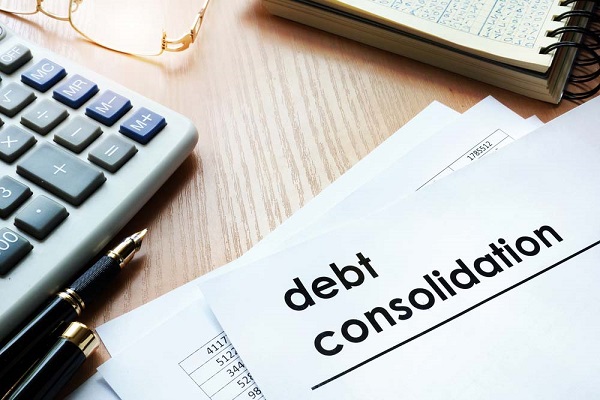Minimum payments don’t seem to reduce your debt and you’re very bothered. You may consider debt relief with a company like National Debt Relief or debt consolidation to help you reduce your monthly payment and find relief from your debt.
You definitely can’t achieve your goals if things keep going like this. A little research will show you some alternatives to consider, of which debt consolidation will undoubtedly be among them. Debt Consolidation will definitely look tempting since it promises easy payment and a small interest rate. However, Dave Ramsey believes that debt consolidation is not a great way to clear your debt. Take a sneak peek at this video to see how he feels about debt consolidation.
A major reason why Dave Ramsey doesn’t believe in the efficacy of debt consolidation is that it’s designed to only clear a small part of your debt. In fact, you pay more than you initially thought, you may also remain indebted for a longer period. Just like every other debt reduction tool, debt consolidation also has its pros and cons.
Let’s further elucidate on debt consolidation to know better about this debt relief:
What is Debt Relief? What Are Negative Outcomes?
There are many forms of debt relief, but the most common is where a debt relief company such as National Debt Relief would consolidate your debt and try to negotiate all of your existing debt for 50% of what is owed.
Your credit score is negatively affected and you may face a debt collection lawsuit, which is why many people consider debt relief only as a last resort.
In addition, you should consider the reviews and CFPB’s advice on debt settlement. For example, you don’t want to start a debt relief program, only to end up with a bad experience.
What is Debt Consolidation?
This involves the act of taking loans from creditors to pay liabilities and consumer debts, which are often unsecured. This debt relief strategy combines many debts into a single and large debt that have a beneficial payoff term. “Favorable Payoff” term here means the reduced interest rate, reduced monthly payment or both. Debt consolidation is an ideal tool that consumers use to reduce student loan debt, credit card debt and other liabilities.
If you’d rather opt for the debt consolidation option, then it’s best to apply through a credit union, a bank or a credit card company. These are the best places to begin the process, especially if you have a reputable history of paying early.
How Does Debt Consolidation Work?
As we defined above, the debt consolidation option combines multiple debts into a single loan—often accompanied by a much-reduced interest rate. A debt consolidation loan will help to adjust your repayment period, reduce your repayment cost, and simplify your monthly payment schedule. However, although the debt consolidation option will help you ease repayments, it also features a gamut of disadvantages. The first disadvantage with this method is that you may take on more debt than before.
Common debt consolidation options you may take advantage of include debt consolidation loans, balance transfer cards and secured loans like personal loans, and home equity loans.
Piece of Information to Have in Mind:
New loan origination fee: Your creditor will definitely require that you pay a specific fee before you’re issued a debt consolidation loan. The fee is termed “prepayment penalty,” and it’s often the balance that’s remaining on your debt. To know if you’d be required to pay a prepayment agreement or not, you’ll have to check through the terms of the loan.
But why exactly does Dave Ramsey say debt consolidation sucks?
Assuming you have two high-interest credit cards, and one of those cards have an APR of 26.5% and a balance of $3,500; the other features a balance of $2,000 and an APR of 24%. A quick mathematical calculation shows that you’ll be required to pay more in total if you opt for debt consolidation as the interest rate will likely be high due to multiple un-serviced loans.
However, I’ll recommend that you use the debt consolidation option if you qualify for a reduced interest rate, and you have enough discipline to avoid using your old credit card. In my opinion, whether you should apply for debt consolidation or not should depend on your credit score.
Ways to Get Out of Debt
It’s not easy to get out of debt, and all this is especially true since you don’t have a money tree behind your house. Luckily, you have easy ways of exiting debt without necessarily being miserable. Here are some of those ways:
1. Pay more than the minimum payment required
A great way to quickly reduce your debt is to pay more than the minimum monthly debt payment that’s required of you. For most debtors, they’re satisfied with making the minimum payment, but adhering to this only favors the creditors.
2. Transfer your debt balance to a 0% APR credit card
Visit your financial service provider and ask them for a card that gives your 0% APR, and requests that your debt be transferred to this card. In some instances, this debt may help you to avoid paying any interest for a 21-month period. Doing this will help you to stop paying interest for some time, and you can commit more finances towards paying your actual debt.
3. Create and Stick to your monthly budget
Creating a monthly budget offers you a sure way to exit debt. By using a monthly budget, you can easily track your expenses to identify and remove some sources of wastage.
Although it’s not easy to make a budget, you can make the process relatively easy by using debt payoff apps and budgeting apps to make things less stressful.

No comments:
Post a Comment